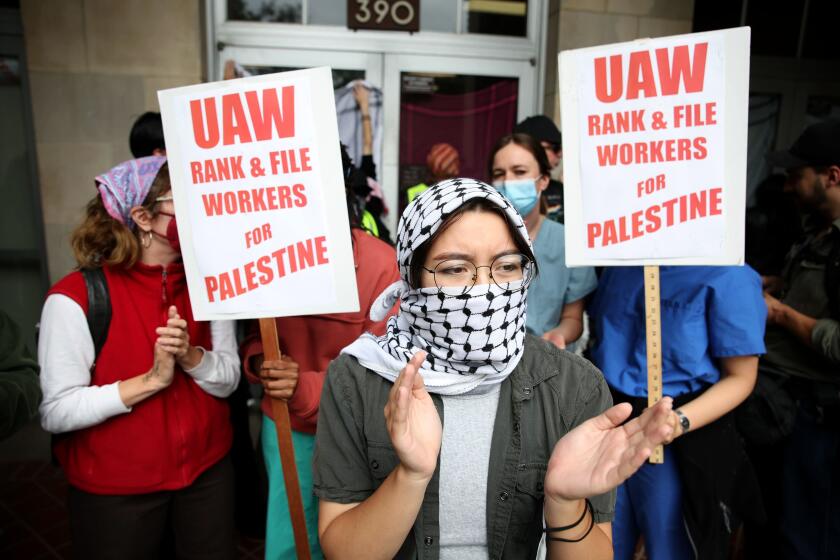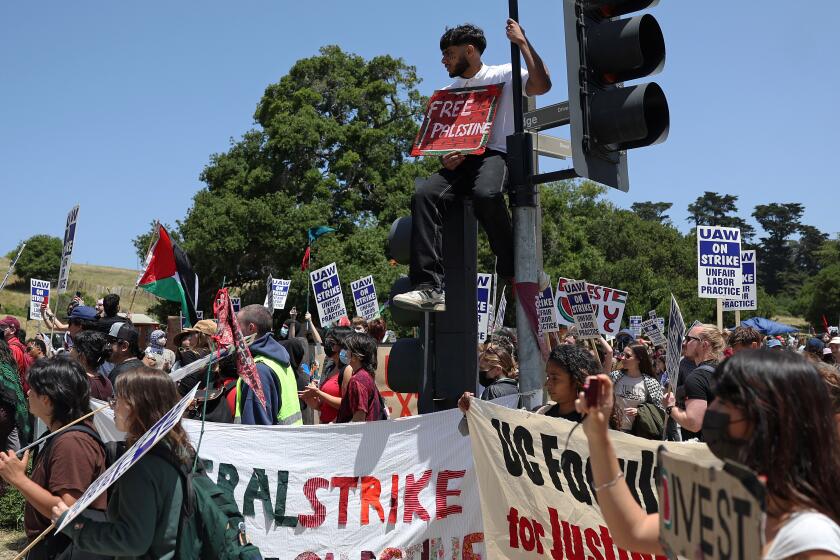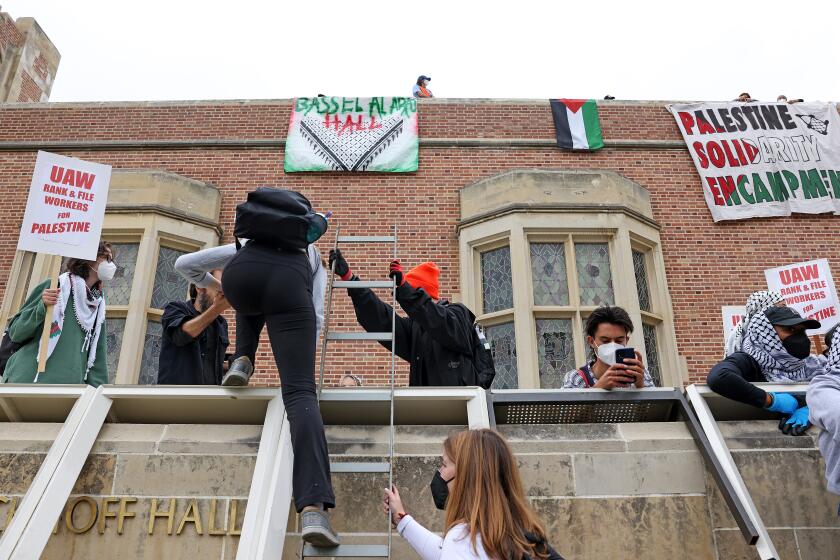Kaffiyehs and pickets: UCLA, UC Davis workers strike over treatment at pro-Palestinian protests
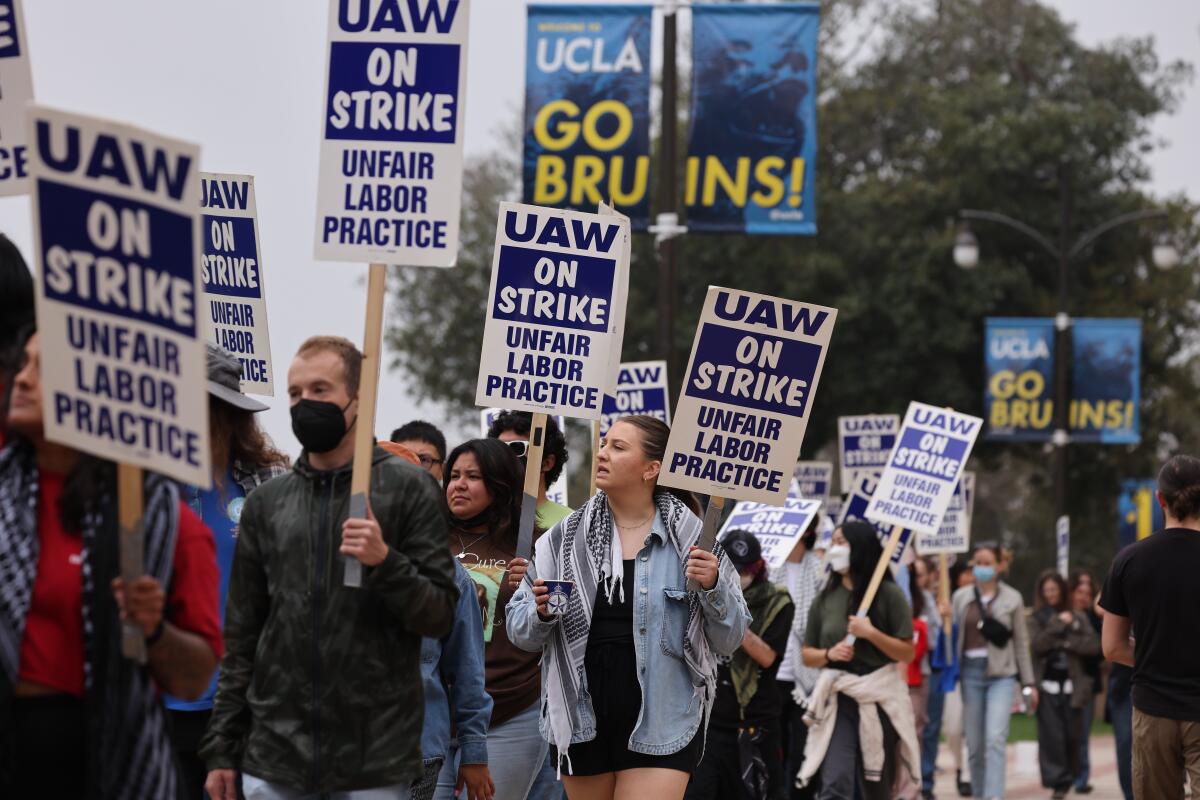
- Share via
Carrying “On Strike” pickets and some wearing kaffiyehs, academic workers at UCLA and UC Davis walked off the job Tuesday, alleging their rights were violated by the University of California’s actions during pro-Palestinian protests and encampment crackdowns.
United Auto Workers Local 4811, which represents 48,000 graduate student teaching assistants, researchers and others at the 10 UC campuses and Lawrence Berkeley National Laboratory, launched the rolling strike last week at UC Santa Cruz. The walkouts unfold at a critical time in the academic year, as classes end and capstone projects, finals and grading are ahead — work in which union members play a key role.
At UCLA on Tuesday morning, a growing group of university workers marched in front of Royce Hall chanting “Our university” and “Union power.” Many held signs that read “UAW on strike” and several wore kaffiyehs, traditional Middle Eastern scarf, to show solidarity with the pro-Palestinian movement.
Picketers temporarily blocked the entrance to at least one visitor parking structure, turning some cars away. A representative approached motorists attempting to turn in to the structure to request they respect the picket line and offered suggestions for other nearby parking lots.
As private security guards monitored the protest from all angles, the marchers continued to chant: “UC, UC, you’re no good, treat your workers like you should!” Some students walking to classes, paused briefly to watch the action or snap a photograph before going about their days.
UCLA union leaders said Tuesday afternoon they have not yet determined the number of members who walked out and did not have data on canceled classes. The UAW represents more than 6,200 workers at UCLA.
UCLA did not move classes online, as did UC Santa Cruz. On its website, UCLA officials said they expected the strike “may cause minor disruptions to campus operations as they picket this week and in the future.” The strike was authorized until June 30.
Many classes at UCLA appeared to be continuing in person Tuesday. However, a few undergraduate students told The Times that their discussion sections had been canceled.
Mary Osako, UCLA’s vice chancellor of strategic communications, said in a statement that students are preparing for finals this week and the university is focusing on supporting them.
“They’re paying tuition and fees to learn, and we’re dismayed by deliberate outside disruptions that may get in the way of that. Students want to hear their professors teach, not the piercing sounds of trumpets, drums and slogans being shouted right outside their classroom windows,” Osako said.
Anny Viloria Winnett, academic student employee unit chair of UAW 4811 at UCLA, called for more than minor disruptions during the rally, saying the strike will continue until their demands are met.
“We need amnesty for our colleagues,” Viloria Winnett told the group. “If your boss is mad at you, good!”
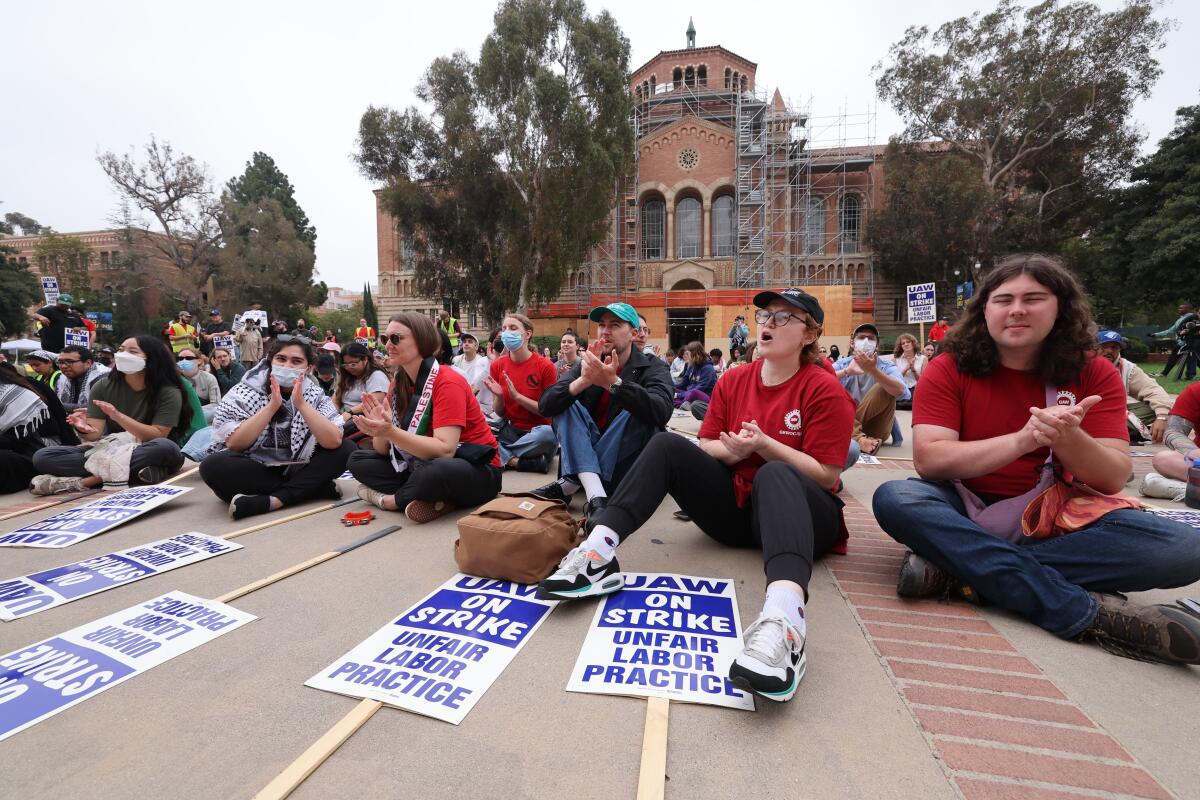
The academic workers contend that their free speech rights were violated when university leaders called on police to forcibly remove pro-Palestinian encampments at several campuses and activists at UCLA were not protected from an attack on the camp by counterprotesters for hours. Police later dismantled the UCLA encampment, making about 200 arrests, including some members of the striking union.
The expanded strike is one of the biggest actions by an American labor union in support of Palestinians and comes as college leaders face scrutiny for calling in police in riot gear to clear pro-Palestinian encampments. The strike could include up to three more campuses as early as Friday, according to the union.
Sam Hunter, a UCLA teaching assistant, said it was “disgusting” how the university called in police during the protests on campus.
“How the university chose to respond to that is why I’m out here today,” he said into a megaphone, as union supporters cheered him on.
Among the crowd were about a dozen graduate student worker guild members from USC, who shared concerns about what one, Maile McCann, called a “militarized response” to campus protests instead of negotiations and bargaining.
For the record:
12:37 p.m. May 29, 2024An earlier version of this story quoted Maile McCann, a USC graduate student worker, as saying the “labor market” is at an inflection point. She said the “labor movement.”
“We’re at a total inflection point in the labor movement right now,” McCann, a USC civil engineering graduate student worker, said. “The fact that they’re taking a stand to hold their university accountable is historic.”
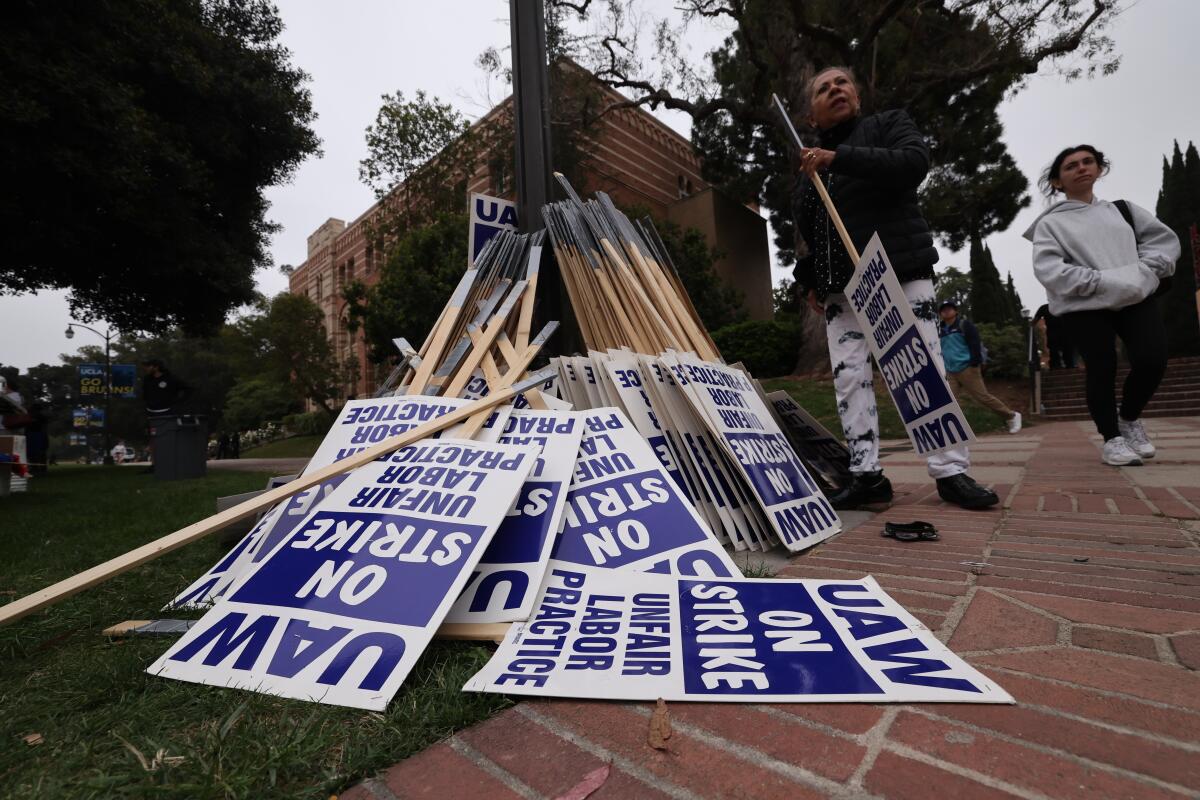
The UC-AFT, the union representing lecturers, who teach about a third of all undergraduate classes in the UC system, has asked its members not to do the work that would normally be done by those on strike.
“Doing this labor could diminish the impact and power of their strike, but also it sets a worrying precedent in accepting an increase to our own workload. It would signal that UC-AFT members, who are already overtaxed and overburdened, are able to pick up more work at a moment’s notice,” the union said.
At UC Davis, where the UAW represents more than 4,600 academic workers, a late-morning rally was scheduled to take place on the quad.
An Instagram post by Davis Popular University for the Liberation of Palestine, a group behind the pro-Palestinian encampment at UC Davis, called Monday night for “No school while genocide is happening! We encourage everyone to skip classes and come show their support with the UAW workers for as long as the strike goes.”
UC officials charge the walkouts are illegal. However, their urgent request to the state labor board to immediately halt the strike was rejected by the panel, which ruled on Thursday that UC’s allegations did not meet the legal standard for intervention.
UC officials claim the strike was illegal because of a no-strike clause, but the state labor board says that isn’t enough to order a stop to the walkout.
Rafael Jaime, the president of UAW 4811, was at the UCLA encampment during the attack in late April and witnessed the violence. He praised the labor board’s denial of UC’s injuction request, saying it “proves that no employer gets to make up its own rules.”
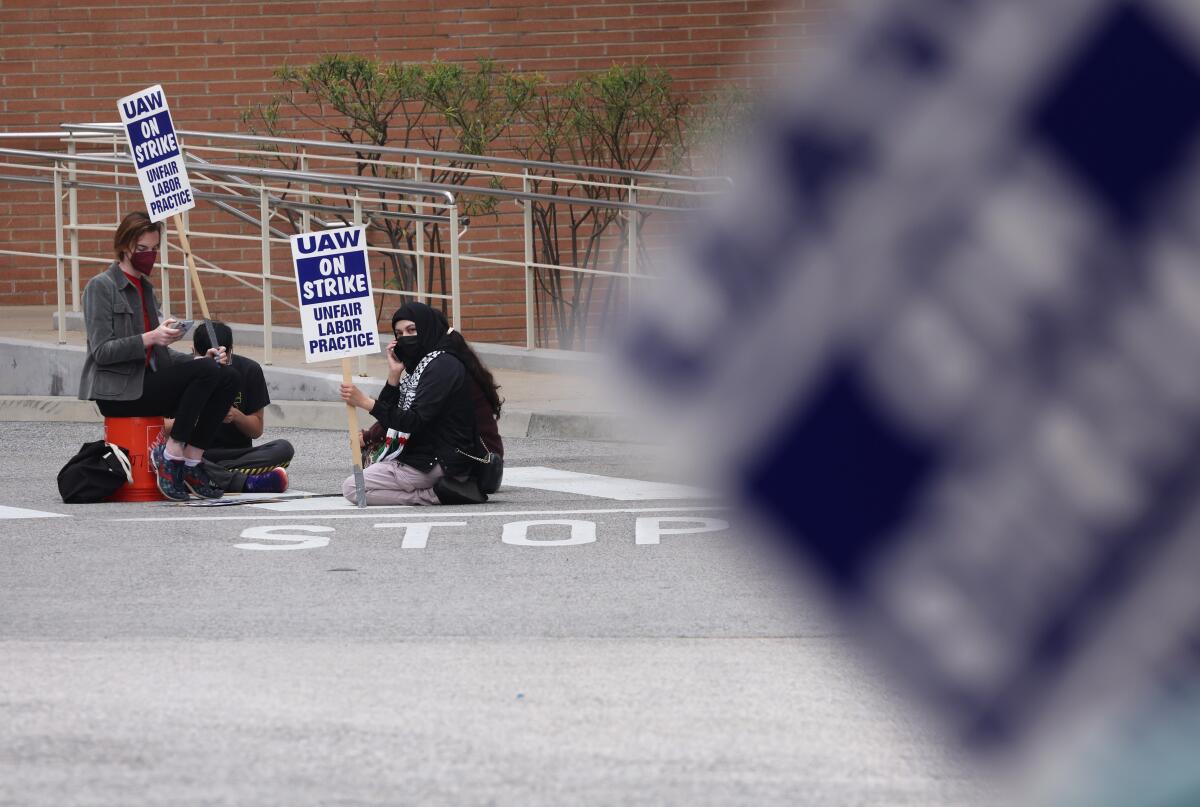
Demands of union leaders include the protection of free speech on campus; an amnesty for all academic employees, students, student groups, faculty and staff who face disciplinary action or arrest due to participation in protests; and divestment by the university from “weapons manufacturers, military contractors, and companies profiting from Israel’s war on Gaza.”
Academic workers walk out to support participants in the pro-Palestinian protests. UC officials call the strike illegal. It could spread to other campuses.
University officials have asserted the strike is unlawful because the goal is “to pressure the university to concede to a list of politically motivated demands closely linked to the protests occurring across California and the nation.”
The union on May 10 filed charges with the state labor board related to the treatment, university discipline and arrests of union members at UCLA and other campuses, including UC San Diego and UC Irvine. The charge accuses the universities of retaliating against the workers and unlawfully changing workplace policies to suppress pro-Palestinian speech.
UC also filed an unfair labor practice charge with the labor board, alleging that the union’s decision to walk out was in violation of the no-strike provision in its collective bargaining agreements. Both charges are pending.
Pro-Palestinian protesters launched a new encampment on the UCLA campus Thursday. Police in riot gear have arrived.
The strike comes amid continuing upheaval on UCLA’s campus.
On Thursday, UCLA Chancellor Gene Block and two other university presidents testified in Washington before the Republican-led House Committee on Education and the Workforce, which is investigating antisemitism on campuses throughout the country. In his opening remarks to the panel, Block said that, “with the benefit of hindsight,” the university should have acted to “immediately remove” the encampment that pro-Palestinian protesters established in late April “if and when the safety of our community was put at risk.”
Block was also questioned about complaints that Jewish students were prevented from accessing parts of campus by pro-Palestinian protesters.
Later that day, more than two dozen officers in riot gear responded to the campus to remove a new, small encampment that protesters had erected.
The last UC academic workers strike, at the end of 2022, resulted in an agreement for significant salary increases and improved benefits.
Times staff writer Howard Blume contributed to this report.
More to Read
Sign up for Essential California
The most important California stories and recommendations in your inbox every morning.
You may occasionally receive promotional content from the Los Angeles Times.
